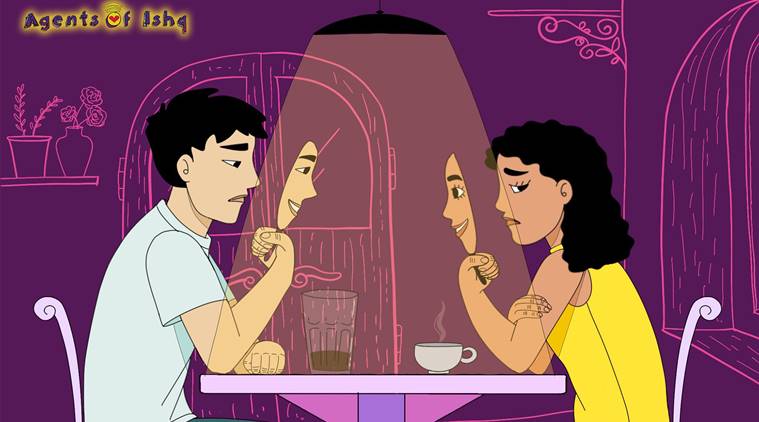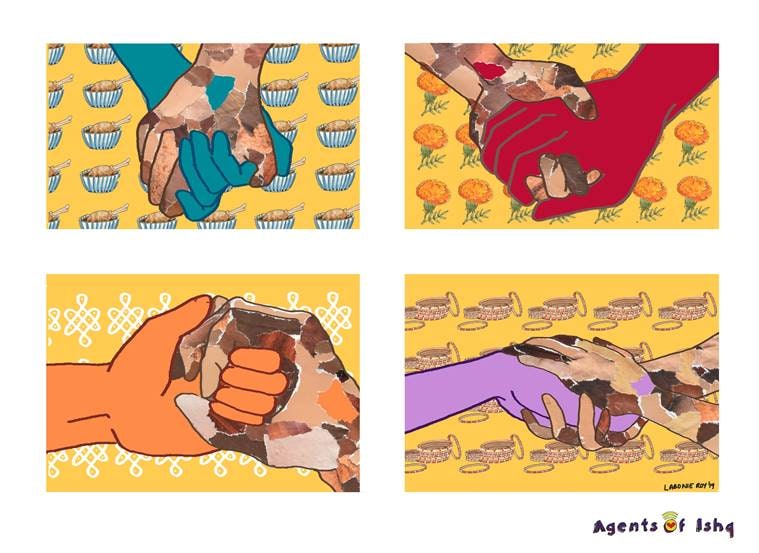 Source: Shivani Parihar/Agents of Ishq
Source: Shivani Parihar/Agents of Ishq
As the protests against the Citizenship (Amendment) Act first began, amidst announcements, videos of arrests, demonstrations and calls for help, the screenshot of a WhatsApp message also circulated. Its sender was unknown. It said: “I’ve reached Red Fort. In case mar war gaya toh please tell Mahek that mera pyaar saccha thha. I forgive her for blocking me. And that she can do much better than that c***u Kaustubh” (I’ve reached the Red Fort. In case I die or something, please tell Mahek my love was true. I forgive her for blocking me and she can do better than that f****r Kaustubh).
In what already seems an innocent past – two months ago – this made many people smile, almost wistfully, at the sweetness of youth and the sureness of passion. Everybody loves a lover. Some folks were sure the sender, let’s call them X, was the better man, who deserved to win the girl. Kaustubh was obviously a useless fellow, probably a mansplainer who would instantly dikhao kagaz, if asked. One who can betray the revolution will obviously betray the maiden, hai na? That’s what the guys who shared it felt anyway.
I, too, was charmed, and shushed the part of my brain that wondered what line X had crossed to be blocked by Mahek. Did Kaustubh make Mahek do it? Or was Mahek one of those fragile people who see overtures as assaults? Also, how are we so sure X is a man – could be any gender and wouldn’t that change the rom-com kahani? Any questions we might ask about the text outside the familiar script of ishq and inquilab leads to disquieting thoughts, the kind that make you wonder if, when it comes to romantic love, most times are potentially a time of violence. Mini Menezes was 17 when she ran away to join the Naxalite movement, spending years underground, always moving to evade capture. Always alert, always watchful. As we must be in times of violence. Ask anyone in an abusive relationship, with the state or a mate.
 Source: Labonie Roy/Agents of Ishq
Source: Labonie Roy/Agents of Ishq
“It was a time of intensity,” Mini, now 63, told me. “We were young. Danger surrounded us. We could be arrested and tortured. Some of our friends were. Some died. We could, too. So, it was also sexually intense, suffused with a sense of carpe diem. There was, also, a lot of questioning about monogamy, sexual freedom for women, which the men weren’t always comfortable with.” How did you think about love, I asked. “I don’t think we did. The sense of danger, that anytime you could be taken, and so could the other person. You didn’t want attachment. You were careful not to get attached.”
Some months ago, at a workshop by Agents of Ishq (AOI, a multimedia project on love, sex and desire), I asked some young men what was the hardest thing about relationships nowadays? “The effort not to fall in love,” said one young man tentatively and the entire room exhaled. “That sounds tiring”. “Very tiring,” said someone. “But if you get attached, you could suffer, the other person could make a fool of you.” Always alert, always watchful. How uncool to think about love, etc. It’s like the news anchor in the Republic TV of your head warning: no one is safe. People just want to make tukde tukde of you. They are lying when they say they love the country. Don’t believe them, they will hurt you. Be alert, love is fake news.
Following this conversation, we did an informal survey at AOI, asking people one thing they loved, and one thing they hated about relationships aaj kal. “Love that there’s choice, that sex is not taboo, that you can have many partners, experiment, open up relationship styles.” “Hate that it’s always undefined, you’re not supposed to have feelings,” declared response upon response.
Everytime I share a cab with a young woman, I hear war stories from dating country. Many begin with, “we shared the same politics”. Why, then, was everything so difficult, so diminishing, I hear them wonder. Why did the other stealth, ghost, bench, breadcrumb or otherwise treat them like they did not matter? “Isn’t that swipe-left-if-you-lean-right approach like wanting to marry someone of the right caste?” I ask. “Maybe it’s better to gauge folks for love-behaviour before political positions?” (Would I be able to take this advice? The jury’s out, as it always seems to be when you need it).
Anyway, if you want to ask for love, what are you supposed to say? Feels like the last time someone asked “what is love?”, it was musician Haddaway in 1993 and his answer was an instruction to others: Baby, don’t hurt me no more.
Once, raging with hurt, I found myself before a therapist, saying, “Things were beautiful when his life was fine. The moment he had difficulties, though… in peace time, it was boundless love, when it’s war time in his life, it feels so inimical.” “Yes, it’s wartime,” she responded. “In wartime, we feel a storm and we fightit. That’s when you need to give love, to accept mistakes and missteps. You are not angry because you are hurt. You are angry because you feel you cannot express love.”
Well, how Insta-worthy, the cynical wartime part of me thought. Express love and be taken for a fool? But the peacetime me, who believes in love, knew it’s true. Except, what is love?
Is it possible to sit with love, before those who have hated us and hurt us? How long can we do this, past the first surge of romance and revolutionary hope? Can we sit in a big mela and say, please come meet us for tea? Even while those who cling to their wounds prefer to cling to power, to keep their faces averted from a message of love? And do those who advocate an encompassing message of love, in turn, avert their faces from those who say we don’t agree with your definition of love? What does it take for eyes to meet across a room crowded with differences?
Love is love, says the queer movement, where some answers gleam, defined against the violence of patriarchy that fixes our meanings. Desire might fertilise fresh definitions. This year at Mumbai Pride, though, a conflict emerged between those who wished to expand the discussion to include those still outlawed by the same edifices that outlawed being LGBTQI – to address Kashmir, caste, being trans – and those who felt this was diffusing the issue. It ended with rifts, offline and online, and 50 people booked for sedition. “We are all feeling attacked, so we are all attacking. There is no wound, only injury. Is anything queer anymore? Or are we all becoming straight?” wrote a friend to me.
We always rely on politics to tell us what love should be. Why don’t we rely on love to tell us about what politics could be? Love, which requires we be vulnerable, have our essence contaminated by another being, love which makes wounds, but also heals – what political suggestions does it make when we’re told violence is the only truth? We don’t ask what is love, any more than we ask what is politics. Maybe both are about simply being able to ask those questions together, prepared for new answers each time.
The Chinese philosopher Mengzi believed that since people are capable of compassion to those close to them, they are capable of extending this to all people, and, thereby, to themselves. This loving approach helps us value all things – relationships, identities, roles, jobs, others, ourselves -equally. This inherent goodness is cultivated if they grow up in a morally rich society, which respects the inter-dependent nature of relationships, and within relationships, is hospitable to diverse, individual qualities. This feels like a useful invitation to define love, when a competitive society chiefly advocates self-interest.
Mengzi also said that if the king loves music, there is little wrong with the land. Maybe a king who can commission a song that asks what love is it will help us to say, as another song goes, what we want, what we really really want. Who knows what we might discover? Maybe that Kaustubh is actually a perfectly nice guy.
Paromita Vohra is a Mumbai-based writer and filmmaker.